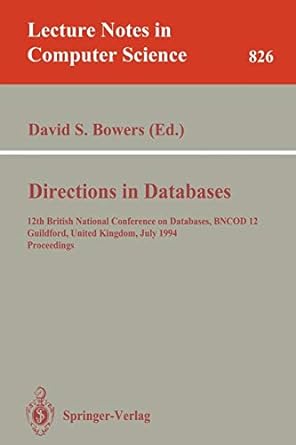Answered step by step
Verified Expert Solution
Question
1 Approved Answer
#include #include /* * The isnumber() function examines the character given as its first * argument and returns true if and only if the character
| #include | |
| #include | |
| /* | |
| * The isnumber() function examines the character given as its first | |
| * argument and returns true if and only if the character represents | |
| * an number. This helper function should be relatively short. | |
| * | |
| * Returns true if the given character represents an number, false | |
| * otherwise. | |
| */ | |
| bool isnumber(char c); | |
| /* | |
| * The decode() function takes a run-length encoded string as its | |
| * argument, parses every integer n preceding every character in | |
| * the string, and prints each character n times. For example, if | |
| * the string passed to decode() is "1a3b", decode() will print | |
| * "abbb". It returns an integer that represents the summed value | |
| * of the amount of characters printed; in this example, decode() | |
| * would return the integer 4. | |
| * | |
| * This function must also handle malformed run-length encoded strings. | |
| * A malformed string is any string which does not adhere to the RLE | |
| * implementation described in the handout. If a malformed string is | |
| * encountered, it should cease printing the decoded string, print an | |
| * error message, and return -1. | |
| * | |
| * Returns the integer value of the total amount of characters printed, | |
| * or -1 if the run-length encoded string is malformed. | |
| */ | |
| int decode(char *str); | |
| /* | |
| * The main function is where C programs begin. | |
| * | |
| * This function parses its arguments and returns the value they | |
| * represent. In this assignment, the only valid argument is a | |
| * run-length encoded string. Any extra arguments in excess of | |
| * this single valid argument make the invocation of your program | |
| * invalid. | |
| * | |
| * Remember that the argument in argv[0] is the name of the program, so | |
| * a program passed exactly one argument on the command line will | |
| * receive _two_ arguments: its name in argv[0] and the provided | |
| * argument in argv[1]. | |
| * | |
| * Arguments: | |
| * argc - The number of arguments received | |
| * argv - The arguments received as an array of C strings | |
| * | |
| * Returns 0 if the argument is well-formed and the string could | |
| * be decoded, non-zero otherwise. | |
| */ | |
| int main(int argc, char *argv[]) { | |
| /* Your main program logic should go here, with helper logic in the | |
| * functions isnumber() and decode(), which you can place below | |
| * the closing brace of main() */ | |
| return 0; | |
| } | |
| /* You should implement isnumber() and decode() here */ |
Note that there is a C library function that could perform the role of isnumber() called isdigit(), and several C library functions that can parse the integers in the RLE string into C integers, including atoi() and strtol(). but you can not use that on it . !!!!!!!!!
input could be like 431a34b4c or just 2a3b2c those are valid but 0a2b no!!!!
using c programming language to do this run length decoding ....
Step by Step Solution
There are 3 Steps involved in it
Step: 1

Get Instant Access to Expert-Tailored Solutions
See step-by-step solutions with expert insights and AI powered tools for academic success
Step: 2

Step: 3

Ace Your Homework with AI
Get the answers you need in no time with our AI-driven, step-by-step assistance
Get Started


